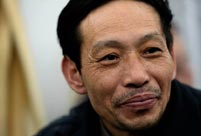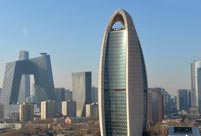 Int'l Snow Sculpture Art Expo in Harbin
Int'l Snow Sculpture Art Expo in Harbin Sichuan money wall for dividend payment
Sichuan money wall for dividend payment Li Na crashes Belinda Bencic in 2nd round at Australian Open
Li Na crashes Belinda Bencic in 2nd round at Australian Open
 Shocking moments when PLA's weapons open fire
Shocking moments when PLA's weapons open fire Famous Lanzhou beef noodles
Famous Lanzhou beef noodles Armed Police hold anti-terrorism drill in SE China's Xiamen
Armed Police hold anti-terrorism drill in SE China's Xiamen Harbin Int'l Ice and Snow Festival opens
Harbin Int'l Ice and Snow Festival opens 'Jin' named the word of the year by cross-strait netizens
'Jin' named the word of the year by cross-strait netizens Chinese scientific expedition goes to build new Antarctica station
Chinese scientific expedition goes to build new Antarctica station
BEIJING, Jan. 27 -- Ethiopian president Mulatu Teshome believes China's investment in Africa will transform the fortunes of the continent.
He equates the role that the Export-Import Bank of China and the China Development Bank play in building infrastructure to that of the Marshall Plan through which US aid to Europe was channeled after the devastation of World War II.
"These institutions are playing a very significant role in Africa's economic development, " he said.
"There are no big words from either side about this but in the financing of these big heavy projects, it is the same."
Mulatu, who became president in October, was speaking in the Presidential Palace in Addis Ababa, which was once the residence of emperor Haile Selassie.
The 57-year-old is very much a Sinophile, speaking fluent Chinese and having spent more than a decade in Beijing, first as a student and lecturer and then as his country's ambassador in the mid-1990s.
He says China, through such bodies as the Forum on China-Africa Corporation, has moved the aid agenda away from humanitarian relief to trade and business.
"The old colonial masters, or the Western powers, shaped international aid architecture in the 1980s and 1990s, which was very much a humanitarian aid agenda. The Chinese have changed it to one that is based on economic interdependence through trade and investment," he said.
Mulatu, who met with Chinese Foreign Minister Wang Yi in Addis Ababa earlier this month, says China's approach is different from that of the World Bank and other Washington-based institutions.
"There are no strings attached to the investment or the aid China is giving African countries," he said.
"All these countries have got their own domestic policies, different political views and attitudes and China is basically complying with all of them."
Mulatu came back from Turkey, where he was ambassador, to become Ethiopia's fourth president, succeeding Girma Wolde-Giorgis, who had completed two six-year terms.
Mulatu's China connections began when he came to study at the Beijing Language and Culture University almost immediately after Chairman Mao died in 1976.
"From the airport we went directly to Tian'anmen Square, where the body of Chairman Mao was lying in the Great Hall of the People. It was within 15 to 20 days of his death," he said.
He went on to study for a degree in philosophy and political economy, followed by a master's and a doctorate in international law at Peking University.
"When I first went the ‘cultural revolution' (1966-76) was no longer in practice but many of my classmates were telling us stories about the good things about going to the countryside and serving the people. I witnessed the coming of Deng Xiaoping Theory and the opening up of China to the outside world," he said.
Mulatu said he has been left with a lasting respect for Chinese culture and the people.
"What makes me admire the Chinese people is that they are hard working, very patriotic and whether they are rich or poor, they all say they work for the motherland."
The future president went on to study at the Fletcher School of Law and Diplomacy at Tufts University in the United States before embarking on a political career, which has included being agriculture minister as well as speaker of Ethiopia's upper chamber, the House of Federation.
Trade between China and Ethiopia has grown more than 25-fold over the past decade to $1.8 billion.
Mulatu said China is helping Ethiopia transform its economy, particularly with manufacturing investment. Chinese shoemaker Huajian Group is looking to create 100,000 jobs in five years.
"What we are witnessing in Ethiopia nowadays in terms of the country's manufacturing capacity would have been unimaginable 10 years ago. Government officials would have never conceived we could have a single factory where 10,000 workers are employed under one roof," he said.
He said Ethiopia, as with other African countries, can capture a significant proportion of the 80 million manufacturing jobs that China is expected to shed over the next few years because of rising labor costs.
"We are going to phase in while China is phasing out. The Chinese textile industry cannot be globally competitive if it continues with a high cost of production."
He said Chinese companies can set up in Ethiopia and sell to the US and European Union and avoid the import duties they would face if they were based in their own country.
"Once they are fully integrated into the Ethiopian economy, what they make won't be called a Chinese product but Ethiopian."
Mulatu said that Ethiopia can shed its 1980s Live Aid famine relief image on the back of manufacturing success and become a middle-income country.
"By then Ethiopia will be very different from what it is today," he said.
 A 60-hour journey home
A 60-hour journey home Int'l Snow Sculpture Art Expo
Int'l Snow Sculpture Art Expo Highlights of China's air force
Highlights of China's air force Airline crew stage flashmob dance at Kunming airport
Airline crew stage flashmob dance at Kunming airport Top15 countries to retire to in 2014
Top15 countries to retire to in 2014 Hot supermodel's new photo album released
Hot supermodel's new photo album released Asia's heaviest box girder finishes 'rotation' in Wuhan
Asia's heaviest box girder finishes 'rotation' in Wuhan Completed facade of People's Daily new headquarters
Completed facade of People's Daily new headquarters Chinese-branded car passes North America standard safety test for the first time
Chinese-branded car passes North America standard safety test for the first time Li Na beats Bouchard to reach Australian final
Li Na beats Bouchard to reach Australian final  Explore the sources of PM 2.5
Explore the sources of PM 2.5 Highlights of Chinese airborne troops'exercises
Highlights of Chinese airborne troops'exercises  'Living in ice house' competition held in central China
'Living in ice house' competition held in central China  Chinese figure in Oscar nominations
Chinese figure in Oscar nominations  Top ten aerospace events in China 2013
Top ten aerospace events in China 2013Day|Week|Month